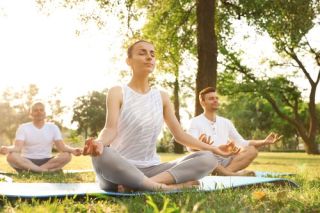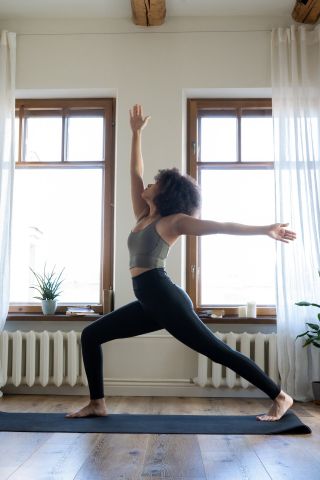Stress
New Research Shows Yoga Reduces Stress and Improves Well-Being
Recent research found improvements in depression and anxiety through yoga.
Posted February 16, 2024 Reviewed by Monica Vilhauer
Key points
- Studies published in 2024 demonstrate yoga’s positive effects on feelings of well-being.
- The latest studies show reduced stress and improved well-being through yoga.
- Recent research shows yoga reduced symptoms of depression and anxiety.

Recent world events (including the Covid-19 pandemic, as well as traumatic events worldwide) have undoubtedly increased stress levels in the US, Europe, and across the globe. In addition to traditional counseling, adjunctive and complementary therapies such as yoga may be especially helpful in reducing stress, as well as symptoms of depression and anxiety. Perhaps partially in response to the increased stress levels globally, there appears to be a plethora of recent academic research studies that examine the potential benefits of yoga.
2024 has revealed promising studies demonstrating that yoga may be just such a complementary therapy to assist in improving feelings of well-being, as well as potentially improving sleep quality and social connectedness, among other beneficial effects.
Different Yoga Types for Every Taste
Numerous forms of yoga exist, with a yoga practice for various tastes and preferences. In the West, Hatha Yoga refers to a number of yoga practices which tend to be slower paced and gentle. Restorative Yoga, an even slower-paced yoga, is meant to relax and restore. Then there are more vigorous and athletic types of yoga such as Vinyasa and hot yoga classes. Additionally, yoga varieties extend from yoga practices that hold the positions (called "postures") for longer periods of time (such as Yin Yoga) to the more traditional yogic practices such as Kundalini, which is both physical and spiritual. Fortunately, especially since the Covid-19 pandemic, one need not leave the comfort of one’s living room to practice yoga, as there are various online yoga classes to be found.
Latest Yoga Research: Yoga for Stress Reduction and Improved Mood
Three recent (2024) studies found that yoga significantly reduced feelings of stress and improved feelings of well-being. In a study newly published in the March 2024 issue of Acta Psychologica journal, individuals who practiced a particular yoga focused on yogic breathing called Sudarshan Kriya Yoga (SKY) demonstrated a significant reduction in stress scores following the yoga intervention. Additionally, the individuals practicing this yoga showed increases in social connectedness scores immediately following the yoga intervention and these scores continued to improve with regular yoga practice.

In February 2024, an online study reported in Frontiers in Public Health revealed that in another form of yoga called Isha yoga, participants reported significantly lower levels of stress and mental distress, as well as higher levels of well-being than individuals who were not practitioners of yoga. Furthermore, the well-being effects of yoga were also examined in the January 2024 issue of the Journal of Health Psychology, which reported on a 6-week randomized controlled trial (RCT), the gold standard of research. In this study, a Kundalini yoga intervention improved participants’ extrinsic affect (ability to express emotions) and their self-compassion, as well as their spiritual well-being.
Additional Recent Yoga Research Backs Up These Findings
Interestingly, the results of these three recent studies have been backed up by additional research published in the last year that examined a large number of yoga studies. The common thread found in a review of various studies was a reduction in symptoms of depression by those practicing yoga. In fact, one study examining older adults during the Covid-19 pandemic found a reduction in depression, anxiety, and stress for those in the experimental (yoga) group. Additionally, they discovered an improvement in their sleep while practicing Hatha yoga. The control group (who did not practice yoga) showed an opposite effect: they had an increase in their depression scores during the study. Additionally, a recent randomized controlled study examining effects of yoga as a complementary therapy for panic disorder also showed positive results in reduction of anxiety and improvement in quality of life.
Taken together, recent research findings indicate yoga may be a promising complementary or integrative therapy for assistance in the reduction of symptoms of depression and anxiety, as well as improvement in feelings of well-being. Additional benefits appear to include increased social connection, improved spiritual well-being and better sleep. As a complement to counseling, yoga holds a great deal of promise in improving well-being and we look forward to seeing further yoga research in the future.
References
Gamonal-Limcaoco, S., Montero-Mateos, E., Lozano-López, M. T., Maciá-Casas, A., Matías-Fernández, J., & Roncero, C. (2021). Perceived stress in different countries at the beginning of the coronavirus pandemic. The International Journal of Psychiatry in Medicine, 57(4), 309–322. https://doi.org/10.1177/00912174211033710
Kanchibhotla, D., Harsora, P., & Subramanian, S. (2024). Influence of yogic breathing in increasing social connectedness among Indian adults. Acta Psychologica, 243, 104164. https://doi.org/10.1016/j.actpsy.2024.104164
Malipeddi, S., Mehrotra, S., John, J. P., & Kutty, B. M. (2024). Practice and proficiency of Isha Yoga for Better Mental Health Outcomes: Insights from a COVID-19 survey. Frontiers in Public Health, 12. https://doi.org/10.3389/fpubh.2024.1280859
Brandão T, Martins I, Torres A, Remondes-Costa S. Effect of online Kundalini Yoga mental health of university students during Covid-19 pandemic: A randomized controlled trial. Journal of Health Psychology. 2024;0(0). doi:10.1177/13591053231220710
Wu, Y., Yan, D., & Yang, J. (2023). Effectiveness of Yoga for major depressive disorder: A systematic review and meta-analysis. Frontiers in Psychiatry, 14. https://doi.org/10.3389/fpsyt.2023.1138205
Baklouti, S., Fekih-Romdhane, F., Guelmami, N., Bonsaksen, T., Baklouti, H., Aloui, A., Masmoudi, L., Souissi, N., & Jarraya, M. (2023). The effect of web-based Hatha Yoga on psychological distress and sleep quality in older adults: A randomized controlled trial. Complementary Therapies in Clinical Practice, 50, 101715. https://doi.org/10.1016/j.ctcp.2022.101715
Yadla, V. S., NJ, P., Kamarthy, P., & Matti, M. R. (2024). Effect of integrated yoga as an adjuvant to standard care for panic disorder: A randomized control trial study. Cureus. https://doi.org/10.7759/cureus.53286


